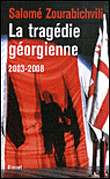“The Georgian Tragedy” by Salomé Zurabishvili

Georgian by birth, French diplomat by profession, Salomé Zurabishvili finds herself, in March 2004, in a few days bombarded Minister of Foreign Affairs of the newly appointed Georgian President, Micha Saakashvili. She discovers a country of origin that she has never really known. But his entry into government quickly resembles a real obstacle course, strewn with pitfalls and disappointments. After the playful period of the "Rose Revolution", the Georgian daily is proving to be full of political pitfalls. And the diplomat is quickly fired unceremoniously by the president. Having become one of the leaders of the opposition today, she retains a certain bitterness from all this period which is reflected in her writing.
But this book has the merit of dismantling the country's democratic and economic pretenses - what she calls "the Potemkin village" -, the Georgian president's permanent strategy of tension and his oversized ego, and the complexity of political life. Georgian, made of permanent reversals.
It dismantles the succession of attacks, true or false, which enamel the public life of this republic of the Caucasus. "Like this grenade which rolls and does not explode, practically at the foot of the presidential platform, on the square full of people (300 people or more)", the day of George Bush's visit to Tbilisi, "without the knowledge of the American and Georgian secret services". "It will be discovered very opportunely once Air Force One is in the air! By the Georgian services which will have thus demonstrated their know-how! Moreover, their
effectiveness will not stop there and, soon, they will arrest a poor boy who, a little remained, who, until this day, wonders in a Georgian prison what could have happened to him. But, without parents and defenseless, he appears to be the perfect victim of this trap!
Its gallery of portraits of Saakashvili, those close to him and tenors of the opposition, sketched sometimes with ferocity, is worth the detour. She dismantles"Appearances: a young team which has not experienced communism, which was educated abroad and which can boast of a break with the previous system. The reality is not that simple. The leaders of the revolution all have links with the previous system. Family ties, financial ties, political ties."
Example: "Nino Burjanadze, the 34-year-old President of Parliament (now in opposition), is a child of the Soviet Nomenklatura. Born in the provinces, having studied in Russia, at the prestigious MGIMO (Institute of International Relations), She comes from a family that served the regime, the Party and the USSR. Her father is part of the immediate entourage of Shevardnadze, one of her most loyal friends to the point that she is nicknamed "the goddaughter". Che. Or even "the princess of wheat", in reference to the billions that her father would have made thanks to the monopoly on wheat imports, during the dark period of Georgia and most often by selling adulterated wheat.
But Georgian President Mikhail Saakashvili is not spared either
• The Georgian tragedy 2003-2008, Salomé Zourabichvili (Editions Grasset, Paris, April 28, 2009, 336 pages, 18 euros)
